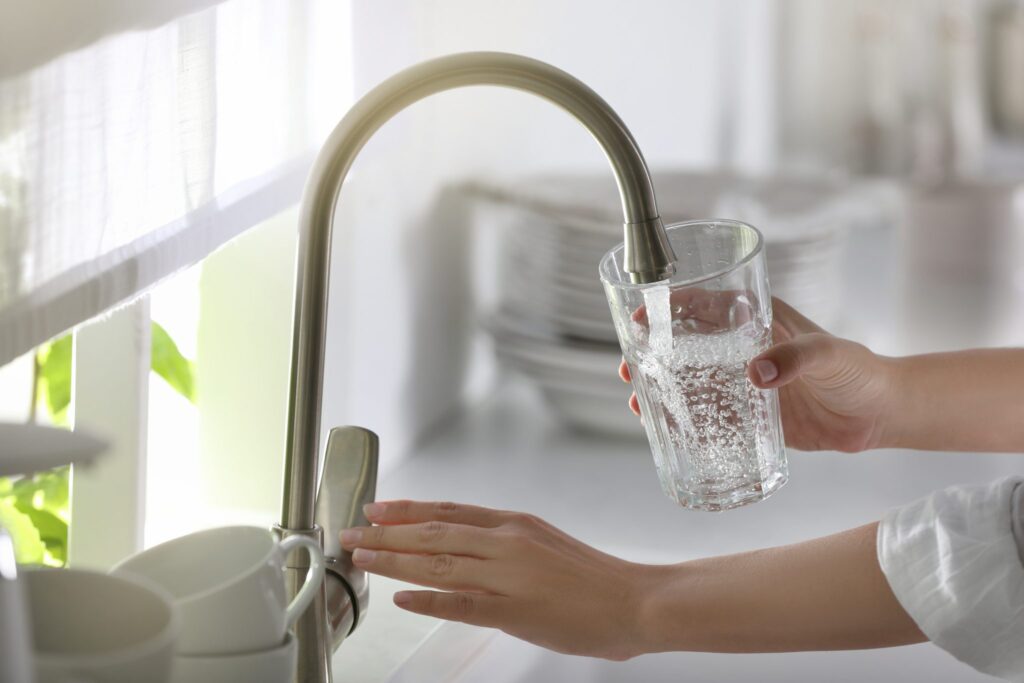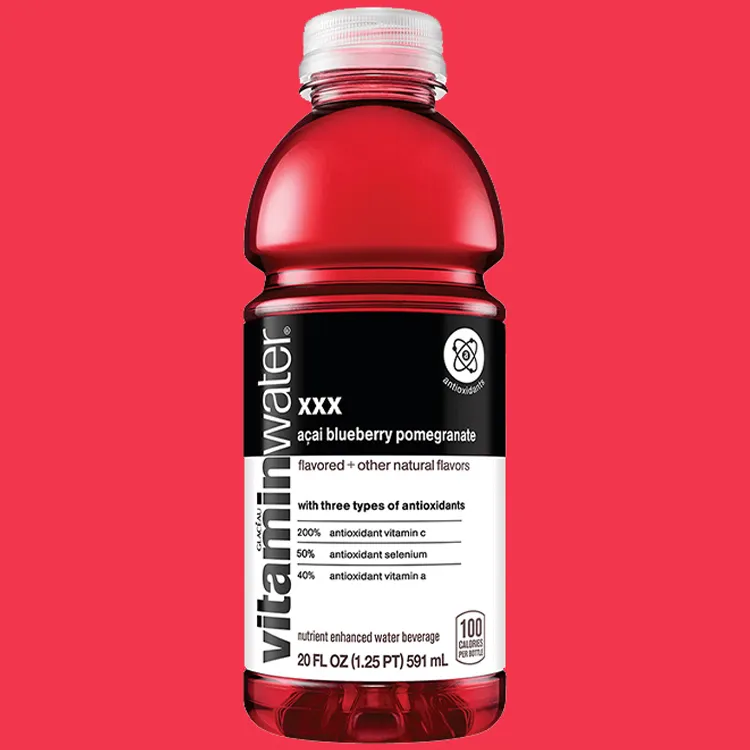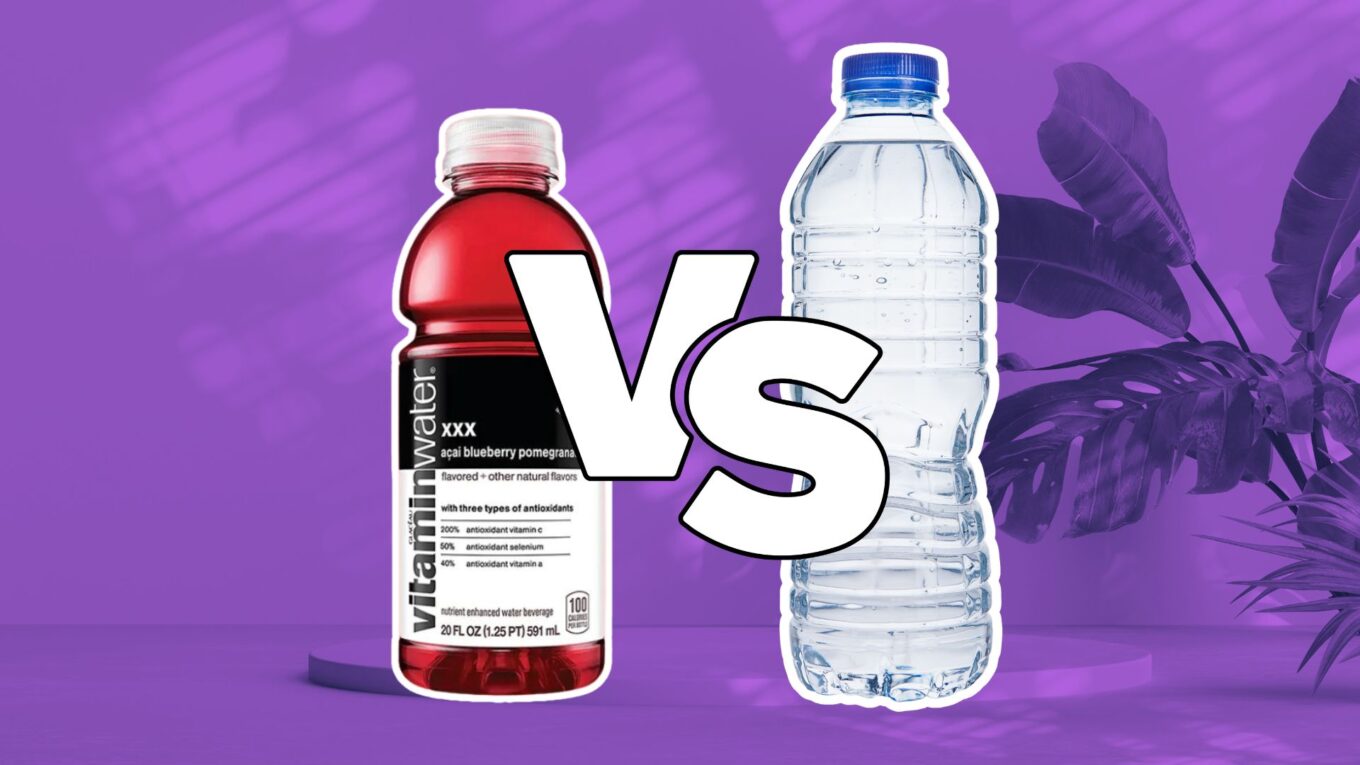Staying hydrated is essential for our well-being, but knowing what’s truly good for you can be tough with so many beverage options.
While Zero Vitamin Water may seem healthier than sugary drinks, is it better than regular water?
This article will examine the facts and compare these two hydration options head-to-head.
You’ll learn about the ingredients in Zero Vitamin Water, its potential benefits and drawbacks, and ultimately discover which beverage is best for your health.
Get ready to satisfy your thirst for knowledge as we explore the ultimate showdown between Zero Vitamin Water and regular water.
What is Regular Water?

Regular water, also known simply as water, is a clear, colorless, tasteless, and odorless liquid that crucially sustains all known life forms.
It is the most abundant substance on Earth’s surface and vital for the proper functioning of all living organisms.
Regular water can be obtained from various sources, each with its own characteristics and treatment methods:
- Tap Water: Tap water is supplied by local municipalities and is treated to meet safety standards set by governing bodies. It is readily available in most homes and businesses, making it a convenient choice for staying hydrated.
- Bottled Water: Bottled water is packaged and sold in various sizes, often marketed as purified or spring water. While it offers a portable option for hydration, the environmental impact of single-use plastic bottles must be considered.
- Filtered Water: Filtered water is tap water passed through filters to remove impurities, such as chlorine, lead, and other contaminants. This process can improve the taste and overall quality of the water, making it a popular choice for those seeking a purer drinking experience.
What is Zero Vitamin Water?

Zero Vitamin Water is vitamin-enriched water that boasts zero calories and no added sugars.
It is marketed as a healthier alternative to regular sugary beverages, such as soda and fruit juices, which can contribute to obesity and other health issues.
What sets Zero Vitamin Water apart from regular water is its added blend of vitamins and minerals.
These nutrients are chosen to provide specific health benefits, such as improved immunity, increased energy, or enhanced overall well-being.
However, it is important to note that the effectiveness of these added nutrients may vary, and a balanced diet is still the best way to obtain essential vitamins and minerals.
Zero Vitamin Water vs. Regular Water- What To Choose?
| Aspect | Regular Water | Zero Vitamin Water |
|---|---|---|
| Hydration Efficiency | Absorption Rates and Effectiveness | Absorption Rates and Effectiveness |
| Absorption | Quickly absorbed, highly effective for hydration | The similar absorption rate, effective for hydration |
| Effectiveness | Ideal for maintaining hydration levels | It provides slight additional benefits due to electrolytes |
| Advantage | Excellent for staying hydrated without added sugars | Beneficial due to added electrolytes, helps maintain electrolyte balance during prolonged exercise |
| Nutritional Value | Essential Nutrients and Their Sources | Essential Nutrients and Their Sources |
| Nutrients | No additional nutrients; purely for hydration | Enriched with vitamins B3, B5, B6, B12, and Vitamin C |
| Sources | Tap, bottled, filtered, and spring water | Vitamins and electrolytes added during production |
| Cost and Accessibility | Price Comparison | Price Comparison |
| Price | Generally inexpensive or free (tap water) | Typically more expensive due to added ingredients |
| Availability | Widely available globally | Available in most regions but may vary by brand and location |
Benefits of Regular Water

1. Detoxification
Water helps flush out toxins and waste products from the body through urine and sweat. This natural detoxification process is essential for maintaining optimal health and preventing the buildup of harmful substances in the body.
2. Temperature Regulation
Water also helps regulate body temperature, particularly during exercise or in hot environments.
The body releases heat through sweating and maintains a stable internal temperature, preventing overheating and heat-related illnesses.
3. Digestion and Nutrient Absorption
Adequate water intake is necessary for proper digestion and nutrient absorption. Water helps dissolve nutrients and facilitate their transport throughout the body, ensuring all cells receive the components required to function correctly.
4. Staying Hydrated
Regular water is essential for maintaining proper hydration, which is crucial for overall health and well-being. When adequately hydrated, the body can function at its best, ensuring that all organs and systems work efficiently.
5. Zero Calories, Zero Guilt
One of the most significant advantages of regular water is that it contains no calories, sugars, or additives. This makes it the perfect choice for those looking to manage their weight or maintain a healthy lifestyle.
Unlike sugary beverages or flavored water options, regular water can be abundant without negatively impacting caloric intake.
6. Lubrication and Cushioning
Water acts as a lubricant and cushion for joints, muscles, and other tissues in the body.
This helps reduce friction and prevents damage during movement, promoting overall physical comfort and mobility.
Benefits of Vitamin Water Zero

1. A Healthier Alternative to Sugary Drinks
Vitamin Water Zero offers a refreshing way to quench your thirst while avoiding the high sugar content in soft drinks and fruit juices.
By choosing this zero-sugar option, you can reduce your overall sugar intake and make a more health-conscious choice regarding staying hydrated.
2. A Convenient Source of Key Nutrients
Each bottle of Vitamin Water Zero contains vitamins such as Vitamin C, B6, B12, and E, which play crucial roles in immune function, energy metabolism, and antioxidant protection.
Vitamin Water Zero can be a convenient supplementary source for individuals who may not always obtain optimal amounts of these vitamins from their diet.
3. Ideal for Calorie-Conscious Consumers
Whether following a specific diet plan or simply aiming to maintain a healthy weight, Vitamin Water Zero allows you to stay hydrated without consuming additional calories.
This zero-calorie feature can benefit individuals on calorie-restricted diets who still want to enjoy flavored beverages.
4. Free from Artificial Colors and Preservatives
Vitamin Water Zero prides itself on being formulated without artificial colors or preservatives, appealing to consumers who prioritize cleaner ingredient lists.
Vitamin Water Zero eliminates artificial additives, offering a more natural alternative to beverages that rely on synthetic colors and preservatives.
This aspect can be particularly important for health-conscious individuals seeking to minimize their artificial ingredient intake.
Concerns with Regular Water
1. Potential Contaminants in Tap Water
While tap water is generally safe to drink in most developed countries, it can sometimes contain contaminants that may pose health risks.
These contaminants can include lead, chlorine byproducts, and microorganisms such as bacteria and viruses. It’s important to stay informed about the quality of your local tap water and consider using a water filter if necessary.
2. Dependence on Bottled Water and Environmental Impacts
The increasing reliance on bottled water has raised concerns about its environmental impact. Production, transportation, and disposal of plastic water bottles contribute to pollution and waste.
Additionally, water extraction for bottling can strain local water resources and ecosystems.
Concerns with Zero Vitamin Water
1. Artificial Sweeteners
Many Zero Vitamin Water products contain artificial sweeteners to enhance taste without adding calories.
However, some studies suggest that certain artificial sweeteners may have potential side effects, such as digestive issues, headaches, and an increased risk of certain health conditions.
More research is needed to understand the long-term effects of these sweeteners fully.
2. Overconsumption of Vitamins
While vitamins and minerals are essential for health, consuming them excessively can lead to potential health risks. Some Zero Vitamin Water products contain high levels of certain vitamins, such as B or vitamin C.
Overconsumption of these vitamins can cause adverse effects, such as nerve damage or gastrointestinal distress.
It’s crucial to be mindful of the total vitamin intake from all sources, including food and supplements.
3. Marketing vs. Actual Health Benefits
Zero Vitamin Water is often marketed as a healthier alternative to sugary beverages, emphasizing its added vitamins and minerals.
However, it is important to evaluate these claims critically and consider whether the potential benefits outweigh the concerns.
Many health experts argue that a balanced diet rich in whole foods is more effective for obtaining essential nutrients than fortified beverages.
Nutritional Breakdown of Zero Vitamin Water
Vitamin Water Zero is more than just a sugar-free beverage; it’s fortified with various vitamins and carbohydrates that can contribute to overall health and well-being.
| Nutrient | Content | Comments |
|---|---|---|
| Vitamin C | 120% of Daily Value per bottle | Supports the immune system, skin health, and antioxidant activity |
| Vitamin B6 | 80% of Daily Value per bottle | Important for metabolism, brain function, and energy levels |
| Vitamin B12 | 80% of Daily Value per bottle | Crucial for nerve function and the production of DNA |
| Vitamin E | 20% of Daily Value per bottle | Acts as an antioxidant, protecting cells from damage |
| Calorie Content | 0 calories per serving | Achieved through the use of non-nutritive sweeteners |
| Sweeteners | Erythritol and Stevia | Erythritol contributes minimal calories, while stevia has none |
| Carbohydrates | 4 grams per bottle, derived from erythritol | Low impact on calorie content due to erythritol’s properties |
Final Words
In the ultimate showdown between Zero Vitamin Water and regular water, it’s clear that both have their pros and cons.
While Zero Vitamin Water offers a tasty, low-calorie alternative to sugary drinks, it’s important to be mindful of the potential health risks associated with artificial sweeteners and added nutrients.
Regular water, on the other hand, remains the gold standard for hydration, supporting essential bodily functions without any additives.
Consider your health goals, taste preferences, and practical factors like cost and availability when choosing.
Ultimately, staying hydrated is key to maintaining overall well-being.
So, whether you reach for a glass of regular water or occasionally enjoy a bottle of Zero Vitamin Water, remember to listen to your body and make informed decisions that prioritize your health.




